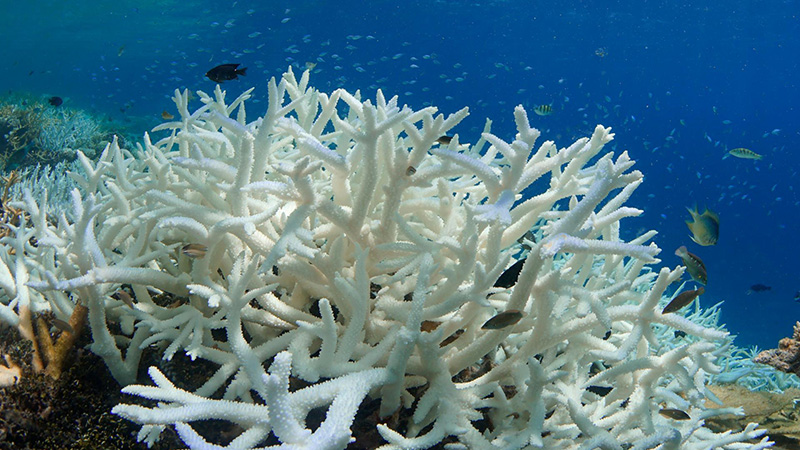Three-quarters of the world’s coral reefs will be exposed to intolerable heat by 2070, even if international pledges on emissions reductions are exceeded, according to a UN-sponsored report.
Under a scenario in which countries beat their national contributions to the Paris climate accord, but still fail to achieve the collective goal of keeping warming below 2C, coral bleaching would begin to occur every year by 2054 on average.
Reefs close to the equator would see annual bleaching occurring even earlier. This would spread to more than 75% of reefs before 2070.
Coral bleaching is caused by excessive heat. Annual bleaching of coral is a death sentence for reef ecosystems, which need a minimum of five years to recover.
“Bleaching that takes place every year will invariably cause major changes in the ecological function of coral reef ecosystems,” said study leader Dr Ruben van Hooidonk from the US National Oceanic and Atmospheric Administration. “Further, annual bleaching will greatly reduce the capacity of coral reefs to provide goods and services, such as fisheries and coastal protection, to human communities.”
What is coral bleaching?
Corals are formed by an interaction between small animals (corals) and very tiny plants called zooxanthellae. Interactions between the two generate a reef’s brilliant colours.
For reasons not clearly understood, when water warms rapidly (even by a small amount like 1C) the zooxanthellae leave the corals, depriving them of their food source and colour. They turn bone white. If the heat persists for too long the coral will die.
Algae, which is usually cleaned off by the living corals, can now grow, making it impossible for colonies of zooxanthellae to return even once the temperature drops. When this happens it takes decades for reefs to recover, if they ever do.
Countries have made emissions reductions pledges to the Paris agreement that would see the world warm by roughly 2.8C. They are expected to build on their pledges in the years to come in order to fulfil the ultimate targets of the accord, which caps warming below 2C. Whether this is achievable remains an open question.
The report considered the heat stress levels on reefs under a scenario that beats the current pledges to the Paris climate accord, but the world still warmed by 2.4C. It compared this scenario to one under which emissions continue roughly as they are today.
The difference to reefs was minimal, lengthening the average timeframe for annual bleaching by just 11 years.
“These pledges do little to provide reefs with more time to adapt and acclimate prior to severe bleaching conditions occurring annually,” said the study’s authors.
“It is imperative that we take these predictions seriously and that, at the very minimum, we meet the targets of the Paris agreement. Doing so will buy time for coral reefs and allow us to plan for the future and adapt to the present,” said Eric Solheim, head of the UN Environment Programme.
Coral scientists have predicted that anything more than 1.5C of warming – which is the lower target of the Paris accord – will be disastrous for reef ecosystems.
A global bleaching event currently underway has already caused bleaching at some reefs for two or even three years in a row. The corals on many, including large tracts of the Great Barrier Reef in Australia, are now dead and will take years to recover. It is the longest global event on record.
